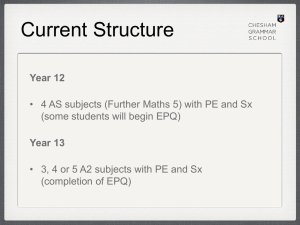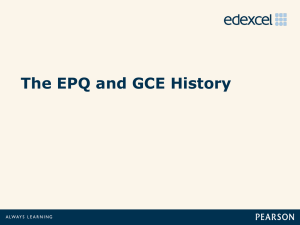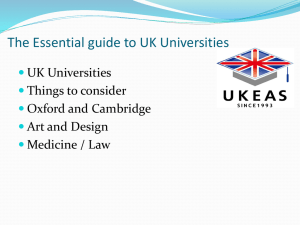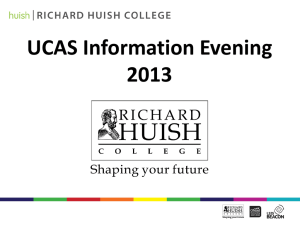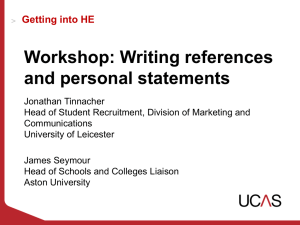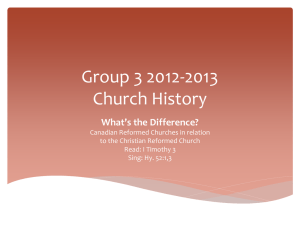BTEC Level 3 Qualifications
advertisement
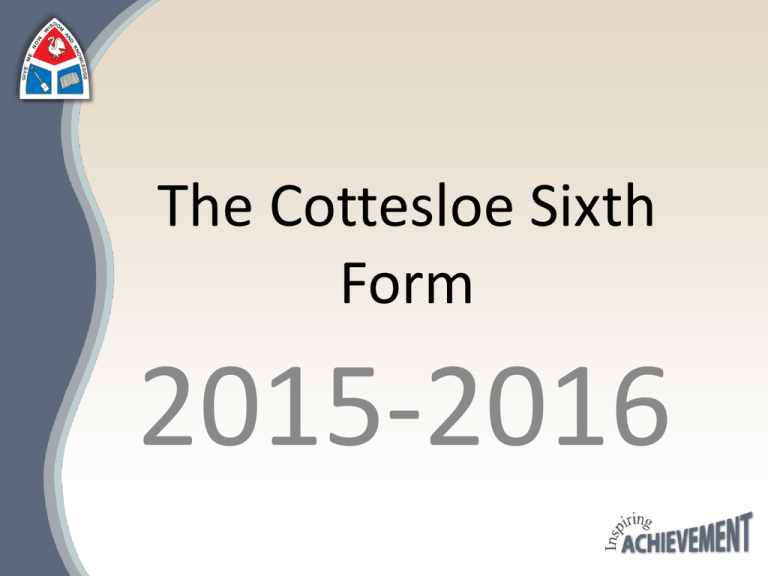
The Cottesloe Sixth Form 2015-2016 Unreformed A Levels • • • • • • • Design Technology Geography • French Geology • Health & Social Care Maths Law Film Physical Education Advanced Level Examinations Un Reformed A levels Two Year Course Public examinations at the end of Year 12 and 13 Some subjects have a coursework element Results are graded A* to E Advanced Level Examinations Un Reformed A levels Year 12 AS Level 50% of Final A Level Grade Year 13 A2 Level 50% of final A Level grade BTEC/Cambridge Technical Level 3 Qualifications These are equivalent to one A Level They are graded at Pass (Equivalent to an E at A Level) Merit (Equivalent to a C at A Level) Distinction (Equivalent to a B at A Level) Distinction* (Equivalent to an A at A Level) Advanced Level Examinations Reformed A Levels Psychology Sociology Biology Chemistry Physics Art English Language & Literature English Literature History Reformed A Levels AS Level and A2 Levels are now separate qualifications – They have been ‘decoupled’ An AS exam result in a subject will no longer contributes to the final A2 grade A full A Level is now a two year course with the grade based entirely on exams at the end of Year 13 BTEC/Cambridge Technical Level 3 Qualifications They are a two year course and assessment is based entirely on coursework and have no terminal exam. Students will complete six individual units (Three in each year) Reformed A Levels After consultation with Universities and other Sixth Forms we have decided that next year we will follow the common model which is to only offer the full A2 course in the reformed subjects Implications • Students will still select 4 courses • That will (normally) include a maximum of three reformed ‘A’ Levels • They will need to drop the unreformed subject at the end of year 12. None of the Reformed ‘A’ Levels can be dropped once they have been started BTEC/Cambridge Technical Level 3 Qualifications • Students can study a maximum of three of these courses plus an Extended Project Qualification (EPQ) • They can be done in conjunction with other A Levels • The Extended Project Qualification (EPQ) can only be done in addition to three other courses Example • • • • Student A History (Reformed) Physics (Reformed) Chemistry (Reformed) Geology (Unreformed) Geology will be dropped at the end of year 12 • • • • Student B Psychology Physical education Forensic Science Geography Student will drop either Physical Education or Geography at the end of year 12 Example Student C • • • • Sociology (Reformed) Physics (Reformed) Chemistry (Reformed) Extended Project Qualification (EPQ) EPQ will be completed at the end of year 12 and student will continue the other three subjects into year 13 Student D • • • • Film Physical education ICT Geography Student will drop either Physical Education, Geography or Film at the end of year 12 Example • • • • Student E Forensic Science Business Studies Travel & Tourism EPQ EPQ will be completed in Year 12 All other subjects are continued into Year 13 Extended Project Qualification (EPQ) Extends abilities beyond A Level specification Carries extra UCAS points - an AS Level Self directed project, rather like a dissertation, which encourages critical, reflective and independent learners Develops decision making, problem solving and presentation skills Increases motivation as students study a topic of personal interest Student Interviews Where do you want to go in life? What are the right courses? • Ones that help you get where you want to go • University • Apprenticeships • Further education • Full time work What are the right courses? Ones that you are likely to succeed in Where can I look? • Universities – The Russell Group • Apprenticeships – Check Sixth Form website • Universal job match website What else? • Current working levels compared to target grades • Current working level compared to entry criteria • Mock exam results • Attendance • Attitude to learning Option Blocks • Built on a ‘best fit’ principle according to the students initial requests • Nearly all will get at least their first three choices • One or two may have two clashes • Students can change their minds up until they start the course in September Applying To University Looking Ahead from Year 11: Laying the Foundations for a Competitive HE Application Choosing A levels: Some Guidelines If the choice of a post-A level course or career is not yet clear it is best to choose a balance of A levels that will be enjoyed. However: Certain career and course options after A level will particular A levels require The more competitive universities have identified some A levels as not being a suitable preparation for some of their more academic courses if more than one of them is taken. University Application Process: Route ahead • Application process starts in earnest after AS exams but start thinking and planning earlier than this. • You apply online for up to 5 universities through UCAS by 15 January except for some art courses (24 March) • For Medicine, Vet Science/Medicine or Dentistry you only apply to 4 universities (plus one other course) with a 15 October deadline • Oxford and Cambridge have a 15 October deadline. Apply to one or other not both • IMPORTANT: apply early in September/ October period Some University Courses will Require Particular A levels • Generally, medical schools require Chemistry at A level and often ask for Biology as well. Some may accept two science AS levels in place of one A level science subject. One other science subject is also often required, for example Physics or Maths. • Dental schools require Chemistry at A level and often ask for Biology as well. • Vet schools vary in their requirements but you will probably be expected to have Chemistry as an AS or A level together with two from Biology Physics or Maths. • Not surprisingly, many degree courses will require that the subject itself has been studied at A level! eg Maths • There are some courses at university for which studying that subject at A level is not necessary. Law and Psychology are examples of this UK Universities • There are 340 institutions currently offering full degree courses in the United Kingdom alone. • There are expected to be 38,000 courses available for the next application round Applying to High Status Universities: The Russell Group The Russell Group is an association of 24 research intensive universities committed to maintaining the highest standards of research, education and knowledge transfer. The Russell Group was formed in 1994 at the Russell Hotel in London. Many of the most competitive and prestigious courses will be found at Russell Group universities However, some competitive and prestigious individual courses might well be in other institutions. The Russell group represents 12% of the higher education sector Beware!!! They do not always offer the best courses. Check Guardian & Times league tables foe specific course ratings The Russell Group Universities Birmingham Bristol Cambridge Cardiff Durham Edinburgh Exeter Glasgow Imperial College, London King’s College, London Leeds Liverpool London School of Economics Manchester Newcastle Nottingham Queen Mary, London Queen’s University Belfast Oxford Sheffield Southampton University College, London Warwick York What do the Russell Group Say about A level Subject Choice? An excellent downloadable PDF guide to post-16 subject choice http://www.russellgroup.ac.uk/informed-choices.aspx What Qualities are Universities Looking for? • Self motivation and commitment to the subject • That you have done more than the syllabus demands • That you can think critically and independently • Ability to think conceptually and can engage with ideas • ‘Students who stick up for themselves stand out. What we are looking for is a student who can address issues in a logical fashion, reason from premises to conclusion. Even if a student is hesitant or shy, how well they think will still be evident.’ Professor Thomas Noe, Oxford Apply online through UCAS (Universities and Colleges Admissions Service) in Cheltenham The competitive advantage Gaining a place at university or college has three stages: • Research Start now!! • The UCAS application • Consideration by HEIs We offer a structured programme of preparation for HE A structured Programme of Preparation from the start of Year 12 University interview preparation and practice An Oxbridge/Russell group Application Programme The EPQ Session for parents Extracurricular activities University visist and University Fair Oxbridge/Russell Group Application Programme We have a partnership with Pembroke college Cambridge and Somerville College Oxford. Only available to non selective schools Member of staff with responsibility for this cohort to advise on course and college choice Visits to Oxbridge Specialist advice Other HE support UCAS Days – during Year 12 and early Year 13. Personal statement writing, application process Specialist Russell Group application conferences Interview preparation and ‘mock’ interviews Additional material on applying for competitive courses Sessions for Parents • To help parents help support students • September and February • Information of the programme, process, finance etc A Proven Record of HE Success Matthew A*AA Material Sciences James AAAB Natural Sciences Durham Adam AAB Geology at Birmingham Imperial Teodora Serena A*A*AB A*A*A English at Goldsmiths Alice A*AAA Chemistry at Southampton Philosophy at Bristol Abi ABB History UEA Zoe ABB Law at Southampton Sophie A*AAB Law at Durham Kelly AAB Law at Exeter


